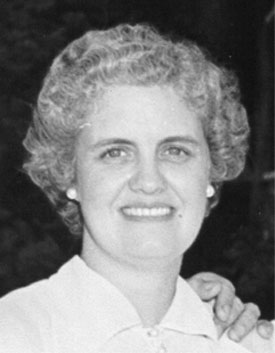 DRURY: Radio?
DRURY: Radio?
DRURY: What was your part in the ministry? You said back at the beginning that you played for Percy in a quartet?
CRAWFORD: Yes, I played the piano and then brought over the original quartet. We always had a quartet. And we had soloists: Hilda Schmeiser, and some of the quartet boys would sing solos. And we got a little orchestra together and it was...really, it was just a wonderful opportunity for me [laughs] to express my music because it was just...I'll never get over the opportunity the Lord gave me. And in 1949.... Well, the radio started in '31 and then we were on a morning devotional program, Pinebrook Praises.
DRURY: Pinebrook Praises, yes.
CRAWFORD: But I don't know the exact year that started. That [pauses]...that would [pauses] probably be in the 40s. And then in the 40s we were on the whole Mutual Network.
CRAWFORD: Radio. Sunday morning we were on over four hundred stations, the whole Mutual Network. And that's when our bill was about ten thousand dollars a week in those days [laughs].
DRURY: And what year would you...would you have gone on television?
CRAWFORD: And then we started television the fall of '49.
DRURY: Is that...Sunday nights was it?
CRAWFORD: Yes, it was WFIL. We went down there to the studio and I know it was '49 because Donna was born in December of '49 and I just played behind the organ. They didn't [laughs] show anything but my face and [pauses] I would...you know, they would, when I played the piano and the organ and so forth.... And then she was born December 10, 1949, and then probably a couple of weeks after that or (oh, I don't know when) a short time after that, well, Percy, of course, showed her picture on TV but I don't [footsteps across room] know exactly when she came on live [laughs]. But the children [door closes], they...they would have started out on TV, right in the beginning, the four boys singing, I'm sure, and then when she was able, she would sit there and wave her hands and lead the boys while they sang.DRURY: There were five children altogether, four boys?
CRAWFORD: Five children: Don, Dick, Dan. Dean and Donna Lee.
DRURY: The Five D's.
CRAWFORD: That wasn't planned that way at all. We just, I don't know...we just named him Donald Bruce and then Richard Torrey. He was named after Reuben Torrey, the...the evangelist or preacher.
DRURY: Yes, Percy...Percy has a lot of his material and...and knows....
CRAWFORD: Yes. Oh, he...yes, he liked Dr. Torrey so much. So Richard was named for him, Richard Torrey. But they were so close in age. They were only sixteen months apart and everything was Donnie, Dickie, Donnie, Dickie. That was just.... So then when the third one came along, then that's when we got the idea to go on with the D's. It really wasn't planned until Dan. And so Dan and Dean and Donna [laughs].
DRURY: The Five Ds. [pauses] You have any...any highlights, you know, in any of the...of the churches that you were in, maybe now these things come to mind? Any of the...? While you're thinking about that one, we...I...I think we should say in this day of TV preachers that...that Percy was probably the...the first...first evangelist to go on...on TV. And perhaps, it seemed to me that on Sunday night he was on...on coast-to-coast on ABC Young People's Church of the Air.
CRAWFORD: Well, that...that was my impression. I thought we were on coast-to-coast and I know we had a station in Chicago and [pauses] that...(was it Dumont Network or something?).... It was kinescopes that we have those....
DRURY: They used film back in those days, sixteen millimeter film.
CRAWFORD: Yeah. [unclear] But he was...I thought he was the pioneer on television.
DRURY: Some people have said that.
